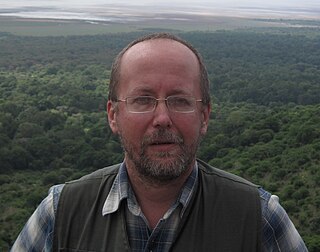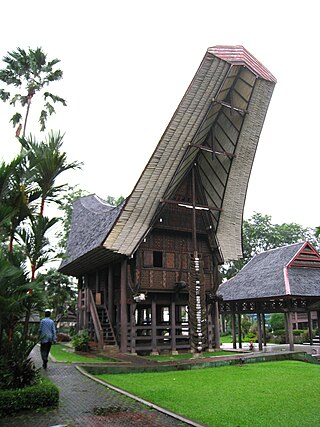
In anthropology, kinship is the web of social relationships that form an important part of the lives of all humans in all societies, although its exact meanings even within this discipline are often debated. Anthropologist Robin Fox says that the study of kinship is the study of what humans do with these basic facts of life – mating, gestation, parenthood, socialization, siblingship etc. Human society is unique, he argues, in that we are "working with the same raw material as exists in the animal world, but [we] can conceptualize and categorize it to serve social ends." These social ends include the socialization of children and the formation of basic economic, political and religious groups.
Iroquois kinship is a kinship system named after the Haudenosaunee people, also known as the Iroquois, whose kinship system was the first one described to use this particular type of system. Identified by Lewis Henry Morgan in his 1871 work Systems of Consanguinity and Affinity of the Human Family, the Iroquois system is one of the six major kinship systems.
Ambilineality is a form of kinship affiliation of cognatic descent that relies on self-defined affiliation within a given social system, meaning individuals have the choice to be affiliated with their mother's or father's group. Common features of societies that practice ambilineality are a shared set of land, communal responsibilities, and collective ownership of some segments of wealth and debt in their societies. This system of descent is distinct from more common genealogical structures in that rather than determining affiliation and descent using the standard determinants of biological and genealogical relation, it instead relies heavily on voluntary affiliation with one's group, oftentimes being determined by factors including residence.

According to a 2009 Pew Research Center report, 93.1% of Turkmenistan's population is Muslim. Traditionally, the Turkmen of Turkmenistan, like their kin in Uzbekistan are Sunni Muslims. Shia Muslims, the other main branch of Islam, are not numerous in Turkmenistan, and the Shia religious practices of the Azerbaijani and Kurdish minorities are not politicized. The great majority of Turkmen readily identify themselves as Muslims and acknowledge Islam as an integral part of their cultural heritage, but some support a revival of the religion's status primarily as an element of national revival.

Chinese folk religion, also known as Chinese popular religion, comprehends a range of traditional religious practices of Han Chinese, including the Chinese diaspora. Vivienne Wee described it as "an empty bowl, which can variously be filled with the contents of institutionalised religions such as Buddhism, Taoism, Confucianism and Chinese syncretic religions”. This includes the veneration of shen (spirits) and ancestors, exorcism of demonic forces, and a belief in the rational order of nature, balance in the universe and reality that can be influenced by human beings and their rulers, as well as spirits and gods. Worship is devoted to gods and immortals, who can be deities of places or natural phenomena, of human behaviour, or founders of family lineages. Stories of these gods are collected into the body of Chinese mythology. By the Song dynasty (960-1279), these practices had been blended with Buddhist doctrines and Taoist teachings to form the popular religious system which has lasted in many ways until the present day. The present day government of mainland China, like the imperial dynasties, tolerates popular religious organizations if they bolster social stability but suppresses or persecutes those that they fear would undermine it.
A segmentary lineage society has equivalent parts ("segments") held together by shared values. A segmentary lineage society is a type of tribal society.
Structural anthropology is a school of sociocultural anthropology based on Claude Lévi-Strauss' 1949 idea that immutable deep structures exist in all cultures, and consequently, that all cultural practices have homologous counterparts in other cultures, essentially that all cultures are equatable.

Unilineal evolution, also referred to as classical social evolution, is a 19th-century social theory about the evolution of societies and cultures. It was composed of many competing theories by various anthropologists and sociologists, who believed that Western culture is the contemporary pinnacle of social evolution. Different social status is aligned in a single line that moves from most primitive to most civilized. This theory is now generally considered obsolete in academic circles.
The relationship between Christianity and politics is a historically complex subject and a frequent source of disagreement throughout the history of Christianity, as well as in modern politics between the Christian right and Christian left. There have been a wide variety of ways in which thinkers have conceived of the relationship between Christianity and politics, with many arguing that Christianity directly supports a particular political ideology or philosophy. Along these lines, various thinkers have argued for Christian communism, Christian socialism, Christian nationalism, Christian anarchism, Christian libertarianism, or Christian democracy. Others believe that Christians should have little interest or participation in politics or government.

The traditional beliefs and practices of African people are highly diverse, including various ethnic religions. Generally, these traditions are oral rather than scriptural and are passed down from one generation to another through folk tales, songs, and festivals, and include beliefs in spirits and higher and lower gods, sometimes including a supreme being, as well as the veneration of the dead, and use of magic and traditional African medicine. Most religions can be described as animistic with various polytheistic and pantheistic aspects. The role of humanity is generally seen as one of harmonizing nature with the supernatural.

Andrey Vitalievich Korotayev is a Russian anthropologist, economic historian, comparative political scientist, demographer and sociologist, with major contributions to world-systems theory, cross-cultural studies, Near Eastern history, Big History, and mathematical modelling of social and economic macrodynamics.
A cousin marriage is a marriage where the spouses are cousins. The practice was common in earlier times, and continues to be common in some societies today, though in some jurisdictions such marriages are prohibited. Worldwide, more than 10% of marriages are between first or second cousins. Cousin marriage is an important topic in anthropology and alliance theory.
A lineage is a unilineal descent group that can demonstrate their common descent from a known apical ancestor. Unilineal lineages can be matrilineal or patrilineal, depending on whether they are traced through mothers or fathers, respectively. Whether matrilineal or patrilineal descent is considered most significant differs from culture to culture.

Tongkonan is the traditional ancestral house, or rumah adat of the Torajan people, in South Sulawesi, Indonesia. Tongkonan have a distinguishing boat-shaped and oversized saddleback roof. Like most of Indonesia's Austronesian-based traditional architecture, tongkonan are built on piles. The construction of tongkonan is laborious work and it is usually built with the help of all family members or friends. In the original Toraja society, only nobles had the right to build tongkonan. Commoners live in smaller and less decorated homes called banua.
The Papuans are one of four major cultural groups of Papua New Guinea. The majority of the population lives in rural areas. In isolated areas there remains a handful of the giant communal structures that previously housed the whole male population, with a circling cluster of huts for the women. The Papuan people are Melanesian people composed of at least 240 different peoples, each with its own language and culture. Sago is the staple food of the Papuan supplemented with hunting, fishing and small gardens.

Christianity is the largest religion in Ghana, with 71.3% of the population being member of various Christian denominations as of 2021 census. Islam is practised by 19.9% of the total population. According to a 2012 report by Pew Research, 51% of Muslims are followers of Sunni Islam, while approximately 16% belong to the Ahmadiyya movement and around 8% identify with Shia Islam, while the remainder are non-denominational Muslims.

Religion in Ivory Coast is diverse, with no particular religion representing the majority of the population. According to the 2021 census, Islam is professed by 42.5% of the total population, while adherents of Christianity represented 39.8% of the population. In addition, 12.6% of Ivorians reported to be Irreligious and 2.2% claimed to follow Animism. Between the 2014 and 2021 censuses, the share of Christians increased from 33.9 to 39.8 percent, while the share of Muslims declined from 42.9 to 42.5 percent of the total population.

Chinese ancestor veneration, also called Chinese ancestor worship, is an aspect of the Chinese traditional religion which revolves around the ritual celebration of the deified ancestors and tutelary deities of people with the same surname organised into lineage societies in ancestral shrines. Ancestors, their ghosts, or spirits, and gods are considered part of "this world". They are neither supernatural nor transcendent in the sense of being beyond nature. The ancestors are humans who have become godly beings, beings who keep their individual identities. For this reason, Chinese religion is founded on veneration of ancestors. Ancestors are believed to be a means of connection to the supreme power of Tian as they are considered embodiments or reproducers of the creative order of Heaven. It is a major aspect of Han Chinese religion, but the custom has also spread to ethnic minority groups.

Melvin Lawrence Ember was an American cultural anthropologist and cross-cultural researcher with wide-ranging interests who combined an active research career with writing for nonprofessionals.
Detailed anthropological and sociological studies have been made about customs of patrilineal inheritance, where only male children can inherit. Some cultures also employ matrilineal succession, where property can only pass along the female line, most commonly going to the sister's sons of the decedent; but also, in some societies, from the mother to her daughters. Some ancient societies and most modern states employ egalitarian inheritance, without discrimination based on gender and/or birth order.












